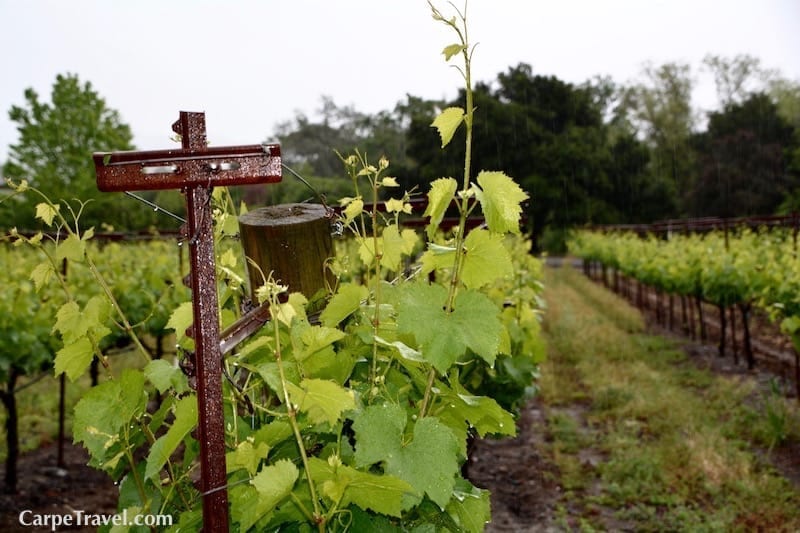Ever dream of leaving it all and escaping to a simpler life? Maybe working in a vineyard, a farm or a ranch? Most people don’t just quit and take off, but the growth in agritourism highlights the desire – and need – to take a break from our urban lifestyles and get back to nature.
What is Agritourism?
According to the American Farm Bureau Federation, “Agricultural tourism refers to the act of visiting a working farm or any horticultural or agricultural operation for the purpose of enjoyment, education, or active involvement in the activities of the farm or operation that also adds to the economic viability of the site.”
Agritourism provides incredible educational experiences to its participants while supporting vineyards, farms and ranches with helping hands and a much-needed economic boost. Not only are you serving others with your contributions and curiosities, but you benefit your health, well-being, and fitness, while getting in touch with your primal urge to commune with nature. You will learn about the food and beverage supply while gaining respect for the farmers and ranchers who toil season after season to feed the planet.
Rather than asking “Is agritourism right for me?” ask, “Which type of agritourism is right for me?”
Whether it’s working a wine harvest, the annual spring maple syrup rush in New England, rustling cattle in the Rockies, or extreme-adventure deep-sea fishing in Alaska, agritourism possibilities are as endless as your imagination. Every state, from Hawaii to Alaska, and the West Coast to the East, has an agritourism opportunity waiting for you.
Will Work for Wine
Dream of spending your autumn helping out with wine grape harvest? Vineyards are always looking for a few people to help them pick grapes. Harvest can be a grueling experience. Think 14-hour days for two or three weeks. Grapes must be picked at the height of ripeness to ensure the best quality wine. That means tonnes of grapes need to be harvested all at once, often overnight, and with a gentle touch that only human labor provides.
Every state produces wine but the best places to work harvest are states with vast vineyards. Hoping to secure a harvest intern position or simply become a vino-teer? The best thing to do is contact your local wine grape growers or winemakers association and ask for leads. California, Oregon, Washington, New York, Virginia, Georgia, Colorado, and states in the Heartland, such as Indiana, Kentucky, and Tennessee offer the best opportunities for budding harvesters and vignerons.
Do what the pros do, and contact your favorite wine producer and volunteer your services. In exchange for room and board, and your blood, sweat, and tears, you will have the experience of a lifetime while gaining insights into what it truly takes to produce your favorite bottle of wine.
Wine professionals go to WineBusiness.com’s job board or the Traveling Winemakers-Living the Dream! Facebook group for leads across the USA and globe. An online search can also point you to local wineries to volunteer with. Simply type in the state you’re interested in, a winery you like and the word “volunteer” or “volunteering.” Additionally, some wineries offer their wine club members to chance to volunteer at harvest too. For opportunities in California – aka small wineries and farms – CalAgTour.org offers a statewide directory of agritourism operations, you can then contact individual groups for opportunities.
Another way to experience agritourism on a vineyard involves a more glam option – staying at a winery hotel. You may not be working the vines but you’ll be immersed in them. One glam vino-teer option is at Rolling Hills Estate Winery in New York. Stay among the vines in one of 16 town homes, volunteer at the farm during the day and sip wine at private dinners with the winemaker in the evenings.
Agritourism Resources
- WWOOF (World-Wide Opportunities on Organic Farms) coordinates volunteers on farms in exchange for room and board.
- World Packers, discover volunteer experiences perfect for you and get access to exclusive travel discounts.
- Workaway, an online community that promotes sustainable travel through volunteering
- Agritourism World
- Farm Stay Planet
- DudeRanch.com is an excellent resource for finding a Dude Ranch for your agritourism adventure.
- The Hawaii Agritourism Association offers resources if you want to have a tropical farm experience
Sweet as Sugar
March is the beginning of maple season in New England – more than a hundred sugar houses will be gathering the amber elixir the old-fashioned way. Maple sap pours from tree trunks through carefully placed spikes into buckets balancing beneath. Sign up for a sugaring class and learn how maple sugar and syrup are made. Take home a supply of maple sugar candy and vials of syrup for special gifts for birthdays and holidays. (Plan your visit around some of the leading festivals – Vermont Maple Festival, Massachusetts Maple Weekend, Maine Maple Sunday, or New Hampshire Maple Month.)
Visit Blais Maple Syrup in Greene, Maine and River Edge Sugar House, in Ashford, Connecticut to sample freshly made maple syrup and sugar candy or contact individual state maple associations to learn about annual volunteer opportunities, maple festivals, and sugar house tours: Connecticut, Maine, Massachusetts, New Hampshire, Rhode Island, and Vermont.
Farm Living is the Life for Me…
Blackberry Farm, in the Smoky Mountains of Tennessee is the most famous agritourism center in the United States. Aside from being a luxury resort and spa, it is a working farm. Amongst its offerings, ranging from horseback riding, fishing, boating, or cycling, Blackberry Farm hosts the Farmstead Field School, devoted to turning your relaxing vacation into an immersive and educational farming experience. Take a guided tour and a gourmet cooking class using the farm’s ripe bounty. End your day with a wine tasting before one of the country’s most legendary fine dining experiences available.
Is livestock more you thing? Local farms need help too. In exchange for hours in the field, hen house, or milking cows, sheep, and goats, you might take a class in cheese-making or learn how to prepare the perfect farm-fresh omelet for your fellow agritourists. Indulge in morning goat yoga sessions, or make friends with the ducks and geese. Pick fresh flowers and take a flower arranging class at a flower nursery and greenhouse. Your farm stay can range from pitching a tent or sleeping in a bunkhouse to glamping or a luxurious weekend in a B&B.
In the heart of the Shenandoah Valley and Amador county wine country, Casa de la Pradera, in Fiddletown, California is a small working organic farm stay that encourages guests to get their hands dirty harvesting fresh fruits and vegetables for daily meals. Venture into the hen house to coax fresh eggs away from cackling hens. Visit for the afternoon or stay in the cozy B&B for a week-long educational retreat.
Head to Carbondale, Colorado, in the Grand Valley between Glenwood Springs and Aspen, and discover an entire enclave of agritourism opportunities where you can learn about farm-to-table agriculture while experiencing exceptional gourmet dining, fly-fishing, hiking, and wellness excursions. Smiling Goat Ranch focuses on healing touch by communing with goats, horses, and other farm animals aimed at soothing anxiety and depression in people of all ages. Learn about high-elevation gardening at Wild Mountain Seeds, and meet a water buffalo at Rocking TT Bar.
Spring Creek Ranch at the base of the majestic Teton Mountains near Jackson Hole, Wyoming offers breathtaking views of the mountains and valley from private hot tubs and rustic yet luxurious suites. Come year-round for wild animal safaris, astronomy nights, or educational nature walks.
Be a Cowpoke for the Week
Consider a week working on a cattle ranch in Colorado, Montana, or the Dakotas. The “Yellowstone Effect” is influencing tourism and opening up ranching opportunities to people from all walks of life. Learn to twirl a lasso, rope a cow, or wrangle a herd of cattle from the high country back to the ranch before the first snow flies. Many dude ranches and working ranches offer guided tours and short-stay options. Spend a day learning to fly fish in a pristine mountain stream or take horseback riding lessons from a cowboy.
Nestled in Zion National Park near Bryce Canyon, Zion Mountain Guest Ranch in Mt. Carmel, Utah offers luxury accommodations coupled with a small organic farm complete with chickens, an orchard, and vegetable plots, perfect for sourcing the freshest ingredients for farm-to-table gourmet meals. Learn to horseback ride, fly-fish, or pack a picnic and an afternoon hike in the gorgeous nearby canyons. Carve out time to spend an evening photographing the ranch’s bison herd against the sunset magenta and pink sky in the distance. Diamond Bar 7 Guest Ranch near Sundance, Wyoming offers a classic dude ranch experience where guests learn to horseback ride, move cattle, and other intricacies of ranch life. Downtime includes dips in the pool, nature hikes, river rafting, and experiencing the local rodeo.
Once a breeding and training center for champion Thoroughbred horses, Wildwood Farm and B & B combines the breathtaking beauty of the San Juan islands with the enchanting experience of being surrounded by exquisite horses. Wildwood offers a rare glimpse into the making of a million-dollar-horse. Indulge in riding lessons, take a leisurely trail ride, or explore the wild nature of the island. The 80-acre estate is a perfect place for bird watching, star gazing, and forest bathing. Whidbey Island, Washington.
Don’t limit yourself to just the United States. Just about every country around the globe has thriving agritourism industries. Most are coupled with eco-tourism themes like sustainability and regeneration. Volunteer for a tree planting project in wildfire-ravaged Portugal, Argentina, or Chile, work to preserve coral reefs in Australia, babysit elephants in Africa and Asia, or care for Pandas in China. When it comes to agritourism, the possibilities are truly endless.


